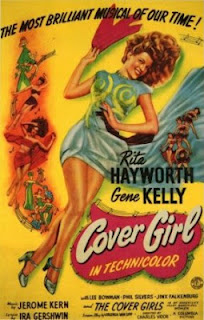Cover Girl
From 1944 comes Cover Girl, directed by Charles Vidor, another pleasant but insubstantial film that hearkens back to another time, when magazine cover girls were famous, even those who appeared on "Farm Journal."
Rita Hayworth stars as a singer in a nightclub owned by Gene Kelly. They are sweet on each other, but neither has made the first move. When another dancer (Leslie Brooks) auditions for a magazine's fiftieth anniversary cover, Hayworth goes along, too, and despite Brooks' attempts at sabotage, Hayworth gets the gig, because the publisher (Otto Kruger) sees the amazing resemblance between Hayworth and an old flame of his (also played by Hayworth). It turns out the two are grandmother and granddaughter.
Kelly is jealous of Hayworth's sudden fame, even if it does drive up business. She is then wooed by a Broadway producer (Lee Bowman), and Kelly, deciding to let her go, forces her to quit. Of course all will turn out all right in the end, as with Du Barry Was a Lady, the message is that one should marry for love, not money.
The songs, by Jerome Kern and Ira Gershwin, are pretty forgettable. Kelly's moment to shine is when he dances with himself as a partner--his mirror image jumps out of a window and the two Kellys dance up a storm. Of course there are comic second bananas--Phil Silvers is Kelly's pal, and Eve Arden plays her usual sardonic character as Kruger's assistant.
Not a bad film, but certainly not a memorable one.
Rita Hayworth stars as a singer in a nightclub owned by Gene Kelly. They are sweet on each other, but neither has made the first move. When another dancer (Leslie Brooks) auditions for a magazine's fiftieth anniversary cover, Hayworth goes along, too, and despite Brooks' attempts at sabotage, Hayworth gets the gig, because the publisher (Otto Kruger) sees the amazing resemblance between Hayworth and an old flame of his (also played by Hayworth). It turns out the two are grandmother and granddaughter.
Kelly is jealous of Hayworth's sudden fame, even if it does drive up business. She is then wooed by a Broadway producer (Lee Bowman), and Kelly, deciding to let her go, forces her to quit. Of course all will turn out all right in the end, as with Du Barry Was a Lady, the message is that one should marry for love, not money.
The songs, by Jerome Kern and Ira Gershwin, are pretty forgettable. Kelly's moment to shine is when he dances with himself as a partner--his mirror image jumps out of a window and the two Kellys dance up a storm. Of course there are comic second bananas--Phil Silvers is Kelly's pal, and Eve Arden plays her usual sardonic character as Kruger's assistant.
Not a bad film, but certainly not a memorable one.



Comments
Post a Comment